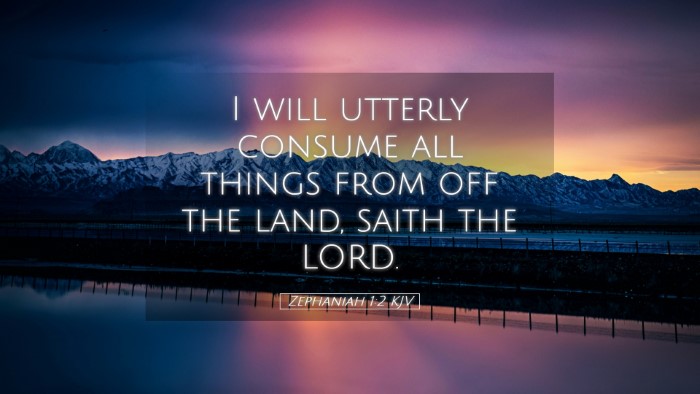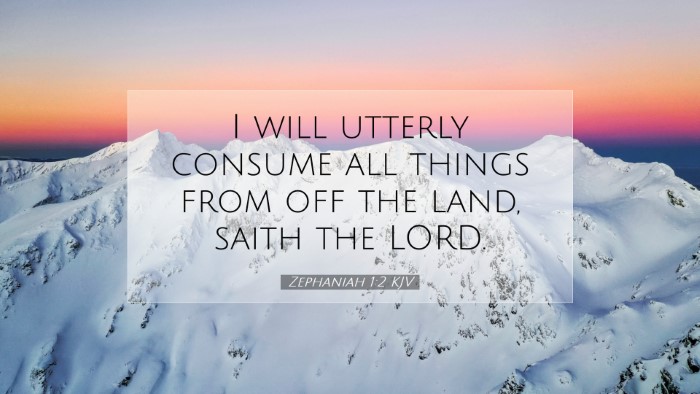Old Testament
Genesis Exodus Leviticus Numbers Deuteronomy Joshua Judges Ruth 1 Samuel 2 Samuel 1 Kings 2 Kings 1 Chronicles 2 Chronicles Ezra Nehemiah Esther Job Psalms Proverbs Ecclesiastes Song of Solomon Isaiah Jeremiah Lamentations Ezekiel Daniel Hosea Joel Amos Obadiah Jonah Micah Nahum Habakkuk Zephaniah Haggai Zechariah MalachiZephaniah 1:2
Zephaniah 1:2 KJV
I will utterly consume all things from off the land, saith the LORD.
Zephaniah 1:2 Bible Commentary
Commentary on Zephaniah 1:2
Bible Verse: "I will utterly consume all things from off the land, saith the Lord."
Introduction
The book of Zephaniah presents a weighty proclamation from God, warning of impending judgment while offering glimpses of hope. In this brief verse, we encounter a declaration of total consumption—a divine decree that carries profound implications for both ancient Israel and contemporary readers. Here, we synthesize insights from various public domain commentaries to unpack the depth of this statement.
Contextual Background
Zephaniah prophesied during the reign of King Josiah (640-609 B.C.), a time marked by significant reforms aimed at restoring proper worship and eradicating idolatry from Judah. Despite these reforms, the people's hearts were still far from God, which necessitated the prophet's stern warnings.
The Nature of Divine Judgment
This proclamation presents a strong image of God's judgment. According to Matthew Henry, this utter consumption reflects God's intent to sweep away all that is contrary to His holiness. It serves to underscore the seriousness with which God takes the sins of His people.
- Judgment and Mercy: While God's judgment is severe, it is not devoid of mercy. Albert Barnes points out that through this act, God is both purging and protecting His creation for the ultimate restoration of righteousness.
- Heralding Change: Adam Clarke emphasizes that this consumption is not simply destruction; it heralds a necessary change and a return to covenant faithfulness. The act of consuming is indicative of divine purification.
Theological Implications
This verse challenges the reader's understanding of God's character, particularly His justice and mercy. The juxtaposition of utter consumption with the promise of restoration invites a deeper reflection on the nature of divine discipline.
Divine Sovereignty
Zephaniah's declaration reflects the sovereignty of God over all creation. According to Henry, when God states "I will utterly consume," He is asserting His authority over the earth's inhabitants and their deeds. This sovereignty requires a response from His people—a call to repentance.
The Call to Repentance
Throughout the book of Zephaniah, there is a repeated call to repentance. Barnes notes that the warning in this verse is a prelude to the larger themes of restoration and hope. The destruction serves as a catalyst for the possibility of renewal, emphasizing the need for the people to turn back to God.
Application for Today's Believers
The striking declaration of total consumption still resonates with believers today. It serves as a sobering reminder of the seriousness of sin and the danger of complacency in faith.
Understanding Judgment in a Modern Context
In contemporary theology, the concept of judgment can be uncomfortable. However, Clarke aptly notes that God's judgment is always coupled with His redemptive purpose. This verse encourages believers to examine their lives, call upon God's grace, and avoid the pitfalls of spiritual apathy.
- Living in Awareness: Just as Zephaniah called the people of Judah to awareness, pastors and church leaders today are encouraged to speak against complacency, urging congregations to actively seek God's presence and holiness.
- Hope in Judgment: The hope offered through repentance and renewal should not be overlooked. God's consuming judgment is not the end but rather a means to purify and reclaim His people.
Conclusion
Zephaniah 1:2 stands as a poignant reminder of God's character as holy, just, and sovereign. The biblical call to repentance and the hope of restoration echo through the millennia, challenging individuals, communities, and nations to turn back to God. By considering the insights of esteemed theologians like Matthew Henry, Albert Barnes, and Adam Clarke, we are better equipped to approach this text with reverence and understanding.


